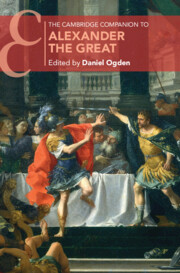Book contents
- The Cambridge Companion to Alexander the Great
- Cambridge Companions to the Ancient World
- The Cambridge Companion to Alexander the Great
- Copyright page
- Dedication
- Contents
- Figures
- Tables
- Maps
- Abbreviations
- Notes on Contributors
- Acknowledgements
- Introduction
- Part I Alexander’s Life and Career
- 1 Alexander’s Birth and Childhood
- 2 The Crises Leading up to Alexander’s Accession
- 3 Alexander and the Greeks
- 4 To the Ends of the World: What the Campaign Was All About
- 5 Alexander and Egypt
- 6 Alexander and the Persian Empire
- 7 Alexander and India
- 8 Alexander’s Death, Last Plans and Burial
- Part II Contexts
- Part III The Historical and Biographical Tradition
- Part IV The Ancient World’s Memory of Alexander
- Alexander’s Timeline 356–321 BC
- References
- Index
- Cambridge Companions to the Ancient World
1 - Alexander’s Birth and Childhood
from Part I - Alexander’s Life and Career
Published online by Cambridge University Press: 04 January 2024
- The Cambridge Companion to Alexander the Great
- Cambridge Companions to the Ancient World
- The Cambridge Companion to Alexander the Great
- Copyright page
- Dedication
- Contents
- Figures
- Tables
- Maps
- Abbreviations
- Notes on Contributors
- Acknowledgements
- Introduction
- Part I Alexander’s Life and Career
- 1 Alexander’s Birth and Childhood
- 2 The Crises Leading up to Alexander’s Accession
- 3 Alexander and the Greeks
- 4 To the Ends of the World: What the Campaign Was All About
- 5 Alexander and Egypt
- 6 Alexander and the Persian Empire
- 7 Alexander and India
- 8 Alexander’s Death, Last Plans and Burial
- Part II Contexts
- Part III The Historical and Biographical Tradition
- Part IV The Ancient World’s Memory of Alexander
- Alexander’s Timeline 356–321 BC
- References
- Index
- Cambridge Companions to the Ancient World
Summary
The chapter collects what may be known of Alexander’s life up until the battle of Chaeronea, for which the source of primary importance is Plutarch’s biography. It attempts to sift what may plausibly regarded as historical from embellishments of various kinds (contemporary and subsequent, propagandist, folkloric or mythologyzing). Particular attention is given to: Alexander’s three birth myths; his education at the hands of Lysimachus of Acarnania, Leonidas of Epirus and Aristotle; Aeschines’ vignette of him as nine-year-old boy; the intriguing traditions bearing upon his horse Bucephalas; his regency during the Byzantine campaign, his foundation of Alexandropolis and his dealings with the Persian ambassadors; his role in the battle at Chaeronea.
- Type
- Chapter
- Information
- The Cambridge Companion to Alexander the Great , pp. 29 - 41Publisher: Cambridge University PressPrint publication year: 2024

